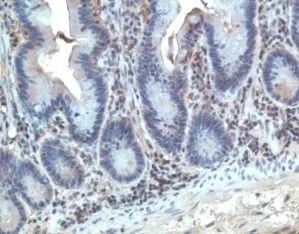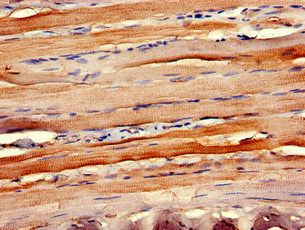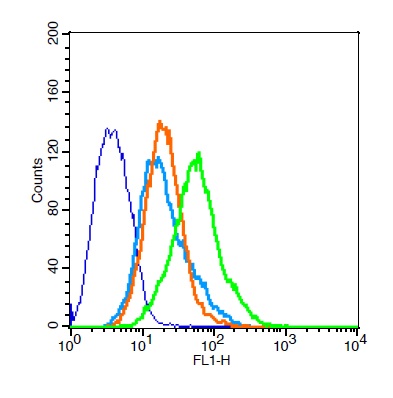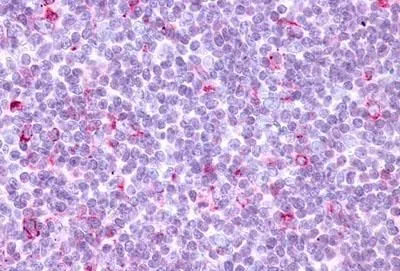
IHC-P analysis of human tonsil tissue using GTX23904 CCR10 antibody.
CCR10 antibody
GTX23904
ApplicationsFlow Cytometry, Western Blot, ELISA, ImmunoHistoChemistry, ImmunoHistoChemistry Paraffin
Product group Antibodies
ReactivityHuman, Mouse
TargetCCR10
Overview
- SupplierGeneTex
- Product NameCCR10 antibody
- Delivery Days Customer9
- Application Supplier NoteWB: 1:500. IHC-P: 1:125. FCM: 1:12. ELISA: 1:37,500. *Optimal dilutions/concentrations should be determined by the researcher.Not tested in other applications.
- ApplicationsFlow Cytometry, Western Blot, ELISA, ImmunoHistoChemistry, ImmunoHistoChemistry Paraffin
- CertificationResearch Use Only
- ClonalityPolyclonal
- ConjugateUnconjugated
- Gene ID2826
- Target nameCCR10
- Target descriptionC-C motif chemokine receptor 10
- Target synonymsGPR2, C-C chemokine receptor type 10, C-C CKR-10, CC chemokine receptor 10, CC-CKR-10, CCR-10, G-protein coupled receptor 2, chemokine (C-C motif) receptor 10
- HostGoat
- IsotypeIgG
- Protein IDP46092
- Protein NameC-C chemokine receptor type 10
- Scientific DescriptionChemokines are a group of small (approximately 8 to 14 kD), mostly basic, structurally related molecules that regulate cell trafficking of various types of leukocytes through interactions with a subset of 7-transmembrane, G protein-coupled receptors. Chemokines also play fundamental roles in the development, homeostasis, and function of the immune system, and they have effects on cells of the central nervous system as well as on endothelial cells involved in angiogenesis or angiostasis. Chemokines are divided into 2 major subfamilies, CXC and CC, based on the arrangement of the first 2 of the 4 conserved cysteine residues; the 2 cysteines are separated by a single amino acid in CXC chemokines and are adjacent in CC chemokines. CCR10 is the receptor for CCL27 (SCYA27; MIM 604833); CCR10-CCL27 interactions are involved in T cell-mediated skin inflammation (Homey et al., 2002 [PubMed 11821900]).[supplied by OMIM, Mar 2008]
- ReactivityHuman, Mouse
- Storage Instruction-20°C or -80°C,2°C to 8°C
- UNSPSC41116161







![CCR10 antibody [HL2852] detects CCR10 protein by immunofluorescent analysis. Sample: Mock and transfected 293T cells were fixed in ice-cold MeOH for 5 min. Green: CCR10 stained by CCR10 antibody [HL2852] (GTX640123) diluted at 1:500. Blue: Fluoroshield with DAPI (GTX30920).](https://www.genetex.com/upload/website/prouct_img/normal/GTX640123/GTX640123_T-45355_20240412_ICC_IF_B_24051400_760.webp)
![CCR10 antibody [HL2853] detects CCR10 protein by immunofluorescent analysis. Sample: NCI-H929 cells were fixed in 4% paraformaldehyde at RT for 15 min. Green: CCR10 stained by CCR10 antibody [HL2853] (GTX640124) diluted at 1:100. Blue: Fluoroshield with DAPI (GTX30920).](https://www.genetex.com/upload/website/prouct_img/normal/GTX640124/GTX640124_T-45355_20241129_ICC_IF_24121100_449.webp)
